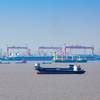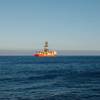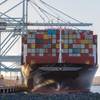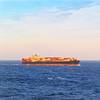There is a disturbing trend developing internationally that will surely be an agenda topping item for the International Maritime Organization in the coming year. At press time the Norwegian RoRo vessel Tampa, its crew of 27 and a reported 438 refugees — including 22 women and 43 children — was still in limbo.
On Sunday, August 26, 2001 in Indonesian territorial waters, Tampa received a call from the Rescue Coordination Centre (RCC) Australia asking it to rescue a fishing vessel in distress, as she was apparently the closest vessel. The Captain was told by RCC Australia that the ship was holding roughly 80 people. The Tampa, which was built to accommodate 40 people safely, suddenly found herself having to rescue 438 people. After the rescue, the ship resumed its voyage toward Indonesia, at which point a group of refugees reportedly approached the captain and crew and promised “dramatic action” if the ship attempted to take them back to Indonesia. Given the number of refugees, the captain saw no alternative but to deviate course and find the nearest port.
However, no safe haven was to be found.
Earlier this year there was a situation involving the gas carrier Castor, which a near fatal deckplate crack in mid-voyage and was denied safe harbor for fear of a potential environmental disaster.
Maritime organizations are speaking out on the Tampa matter loud and clear, as BIMCO noted in a news release: “The international community has chosen to ignore international protocols and regulations regarding the safe and timely disembarkment of such refugees ... Moreover, forcing a vessel to continue navigation whilst burdened with such a large number of people on board, for which she is neither designed nor equipped, is a reckless disregard of the stipulations incorporated into SOLAS.”
The Center for Seafarers Rights (CSR) of the Seamen's Church Institute of New York & New Jersey perhaps put it best: “A cherished and protected maritime tradition is a mariners' obligation to go to the aid of all persons in distress at sea, without regard to their nationality, status or religion," said Douglas B. Stevenson, Director of the Center for Seafarers' Rights in a letter to the Australian Prime Minister and the Ambassador to the United States. "We are very concerned that no actions be taken by any state that might create a disincentive for vessels to respond to a distress at sea. Australia's detention of the M/V Tampa and refusal to accept the shipwreck survivors places an unreasonable financial burden on the ship and establishes a negative precedent for those masters and shipowners to comply with their moral and legal obligation to rescue persons in distress at sea."
Sponsored Content
Chris-Marine’s solutions help to prolong engine lifetime

Subscribe for
Maritime Reporter E-News
Maritime Reporter E-News is the maritime industry's largest circulation and most authoritative ENews Service, delivered to your Email five times per week










